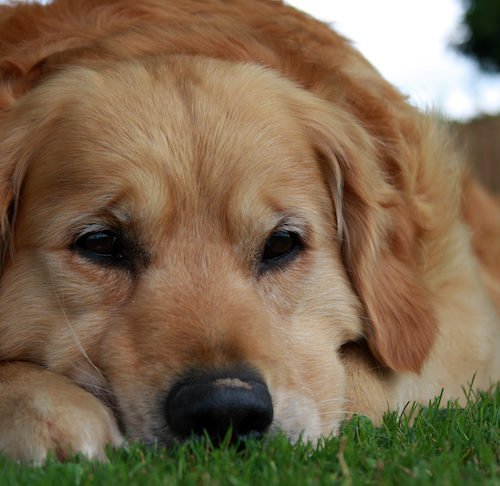If your old dog wants to be alone, they might be suffering from:
- Depression and anxiety — a significant loss, change, or trauma can cause changes in social behavior.
- Illnesses and pain — our dogs can’t tell us when they are in pain, but they can distance themselves in an attempt to get more comfortable.
- Old-age — cognitive dysfunction and a significant decline in their physical capabilities may cause social distancing of our dogs.
My Old Dog Wants To Be Alone — What Does That Mean?
My old dog wants to be alone, so what do I do now? This is a question I’ve asked myself for days.
So, immediately after I noticed a change in behavior of my old dog, the feeling of worry coiled itself in the pit of my stomach.
I’ve had my dog for a little bit over ten years. He’s my best friend and has been my rock through a lot of tough times.
There’s nothing I love more than coming back home after a long day of work and cuddling with my dog on the couch.
But, lately, my old dog has been anything but enthusiastic about our afternoon cuddles.
He’d come and say hello to me when I got home, and we’d play for a bit.
However, after a while, instead of jumping on the couch to be my Netflix watching buddy, he’d wander off somewhere in the apartment.
More often than not, I’d find him in the guest bathroom.
So, as soon as my dream-like after-hours activity of couch cuddling with my dog stopped being a reality, I jumped into research mode.
What does one do when their old dog wants to be alone?
My Old Dog Wants To Be Alone — Why?
I always knew that someday my faithful dog would leave me. The heartbreaking truth that all dog owners have to live with is that the doggo’s lifespan is simply shorter than ours.
But knowing that and facing it as a new reality when you have an old dog are two different things.
That’s precisely why I started researching my dog’s odd behavior as soon as it manifested. All dogs are incredibly social, but my furry friend was the most social dog I ever met.
So, when that changed and he started spending more time alone than with me, I thought that something had to be terribly wrong.
In fact, in my research, I found that there are quite a few things that may lead to the isolation of dogs:
- Depression
- Illnesses
- Anxiety
- Old-age
- Pain
Depression and Anxiety
Just like humans, dogs can get anxious. Not to mention, depression isn’t that uncommon either.
And, although I saw no reason for my furry buddy to get depressed or anxious, I had to look into it as a possible reason for changed behavior.
If your dog has been through a traumatic event, then sudden anxious or depressed behavior isn’t that uncommon.
The best thing to do (which I did) is to take them to the vet. They can see if anything is wrong and determine the proper treatment.
Old-Age and Pain
When it comes to anxiety, old dogs have to deal with the same stuff older humans do. Their hearing, sight, and mobility are deteriorating each day.
Thus, the dogs have a whole new reality they have to deal with.
In other words, old dogs can’t smell, see, or hear things the way younger ones can, which can make them skittish, anxious, or simply scared.
It’s a lot to process, especially if their humans have no idea that they are losing the ability to go through life the way they used to.
They can’t orient themselves or interact with the environment in the same way as they did when they were spring chicken doggies. So, they might seek solitude.
Dealing With Pain
With old age comes pain. Old dogs are no strangers to joint, muscle, tendon, and other types of pain.
So, if your old dog wants to be alone, there’s a possibility that they are looking for a place that’s the most comfortable for them.
I already mentioned that my old dog was seeking refuge in my guest bathroom. After extensive research and a few trips to the vet, we found out he has arthritis.
The guest bathroom (which no one really frequents) was an ideal place to deal with pain and aches (according to my dog).
What Should I Do If My Old Dog Wants To Be Alone?
No matter what type of problem our old dogs have, they can’t tell us about them. My Nan always complains about stuff. Well, she’s old, so she gets to complain.
Then again, so is my dog. And yet, he can’t utter a single word. Still, that doesn’t mean he isn’t sending me signals.
Mind the Behavior
We should always keep our dogs’ behavior in mind. Are they sleeping enough? Are they eating properly?
What about their bowel movements?
Any change there?
Changes in any behavior can be leads on your quest to figure out why your old dog wants to be alone. Maybe the dog needs a change in diet?
Old dogs can’t digest food the way younger dogs can. So, there might be some dietary changes you’ll have to make.
Furthermore, changes in sleeping patterns, appetite, and activity might mean that there’s an illness that you aren’t noticing.
Consult a Professional
Because no one likes to play a guessing game, it’s always best to take your dog to the vet.
As soon as you notice weird behavior of any kind, write it down, and take your furry buddy straight to a professional.
They can make a proper assessment and recommend therapy if necessary.
Fluid therapy, a special diet, medication, or occupational therapy are sometimes necessary if we are trying to coax our old social doggo out of the shell of self-isolation (depending on what the main cause is).
Chances are, you’re already monitoring your old dog like a hawk. So, you’ll probably notice changes pretty early on.
However, what happens when there are no other changes except the one where your old dog wants to be alone?
End of Life Isolation
There’s an urban legend that dogs try to leave their homes or isolate themselves because they can feel that they are going to die.
Apparently, they do so either to spare us the grief or to find the perfect place for one last, eternal nap.
Although this sounds wonderful and romantic, it’s far from the truth.
Our old dogs who seek isolation are probably suffering from cognitive dysfunction and definitely experiencing a significant decline in their physical capabilities.
So when our dogs wander off, they aren’t leaving us so they could die alone. They probably got lost. It happens to the best of us (even my Nan!).
Their faculties are on the decline. What’s more, their hearing and sight aren’t as helpful as they were a few years ago. Therefore, wandering off isn’t that uncommon.
What Should We Do Then?
The best we can do is keep an eye on our dogs. We should do everything we can to make their last stage of life at least bearable.
However, sometimes no one can help. Sometimes our dogs are in so much pain that some people consider keeping them alive cruel.
That’s why many owners go along with the advice of their vets and put their old dogs down. It’s a better alternative to watching your dog suffering, believe me.
Alternatively, there are quite a few veterinary hospice programs that can keep your old dog comfortable until its last breath.
A Few Parting Words
There are a lot of behavioral changes that old dogs manifest. Some of them are easy to deal with, and others are heartbreaking.
When I saw that my old dog wants to be alone, I was a bit taken aback, not to mention sad.
The changes in social behavior aren’t uncommon in older dogs, but I was really fearing the worst.
As I’m guessing you’re doing the same, I hope my advice will help you and give you some peace of mind.


